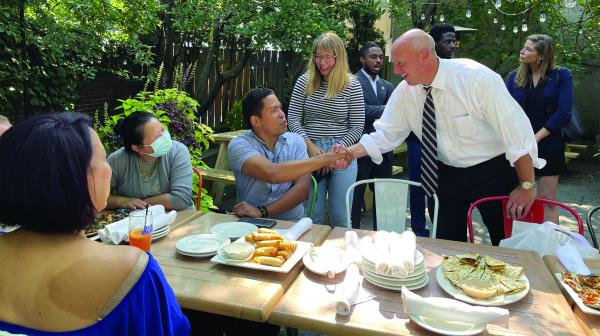August 19, 2021

Mike Kennealy, Gov. Charlie Baker’s economic development chief, shakes hands at the Blarney Stone in Fields Corner. He swung through Dorchester and Mattapan last week to pitch the Baker administration’s $2.9 billion spending proposal for recovering from coronavirus. Courtesy EOHED
Gov. Charlie Baker’s economic development chief last week stopped in Dorchester and Mattapan as part of an effort to tout the administration’s $2.9 billion proposal aimed at helping the state recover from the coronavirus pandemic. Mike Kennealy, who oversees housing and economic development, is taking the tour to small businesses and downtowns across the Bay State.
The funds are available to Massachusetts through the federal American Rescue Plan Act (ARPA). Baker is seeking to spend $350 million on downtown development and reinvestment. Roughly a billion dollars is earmarked for housing.
“It doesn’t mean people are completely out of the woods,” he said of the pandemic. “If you want to see economic damage, look at our downtowns.”
In Dorchester, Kennealy swung through 50Kitchen on Dorchester Ave. before a roundtable discussion at the Blarney Stone in Fields Corner. Earlier on Tuesday (Aug. 10), he stopped at America’s Food Basket on Cummins Highway in Mattapan, as well as Frugal Furniture on Blue Hill Ave.
“We’re here to listen and learn,” he said.
The federal government handed Massachusetts nearly $5.3 billion in pandemic relief, and state lawmakers have formed committees to determine how to spend it.
They’re having their own listening sessions, including some this fall, and they’re pushing for a slower timeline than Baker. The federal government wants the money spent by the end of 2026.
Dorchester state Rep. Dan Hunt, chair of the House Committee on Federal Stimulus and Census Oversight, said he was glad to see Baker administration officials seeking input from members of the public.
“The House is committed to a robust public process,” he said.
Kennealy said he’s heard from business owners about concerns whether they can continue to operate. “These small businesses make up the fabric of our communities,” he said. “These are key employers, they employ our citizens, they serve their customers.”
During the pandemic, the financial support from the government focused on survival and protecting employee paychecks. A year later, issues that previously surfaced before the pandemic are coming up again, according to Kennealy. “There’s always been an issue around access to capital for small companies. So we’re thinking about how we can fill some of those gaps.”
Companies also want to do more online, with businesses on main streets seeking to boost their capability for internet purchases, he added.
That’s the kind of new perspective that the tour is going to give the administration, he said. “We’re going to get a refined sense of what the needs are,” he said. “Halfway into this, some of these needs are urgent.”
Material from State House News Service was used in this report.




